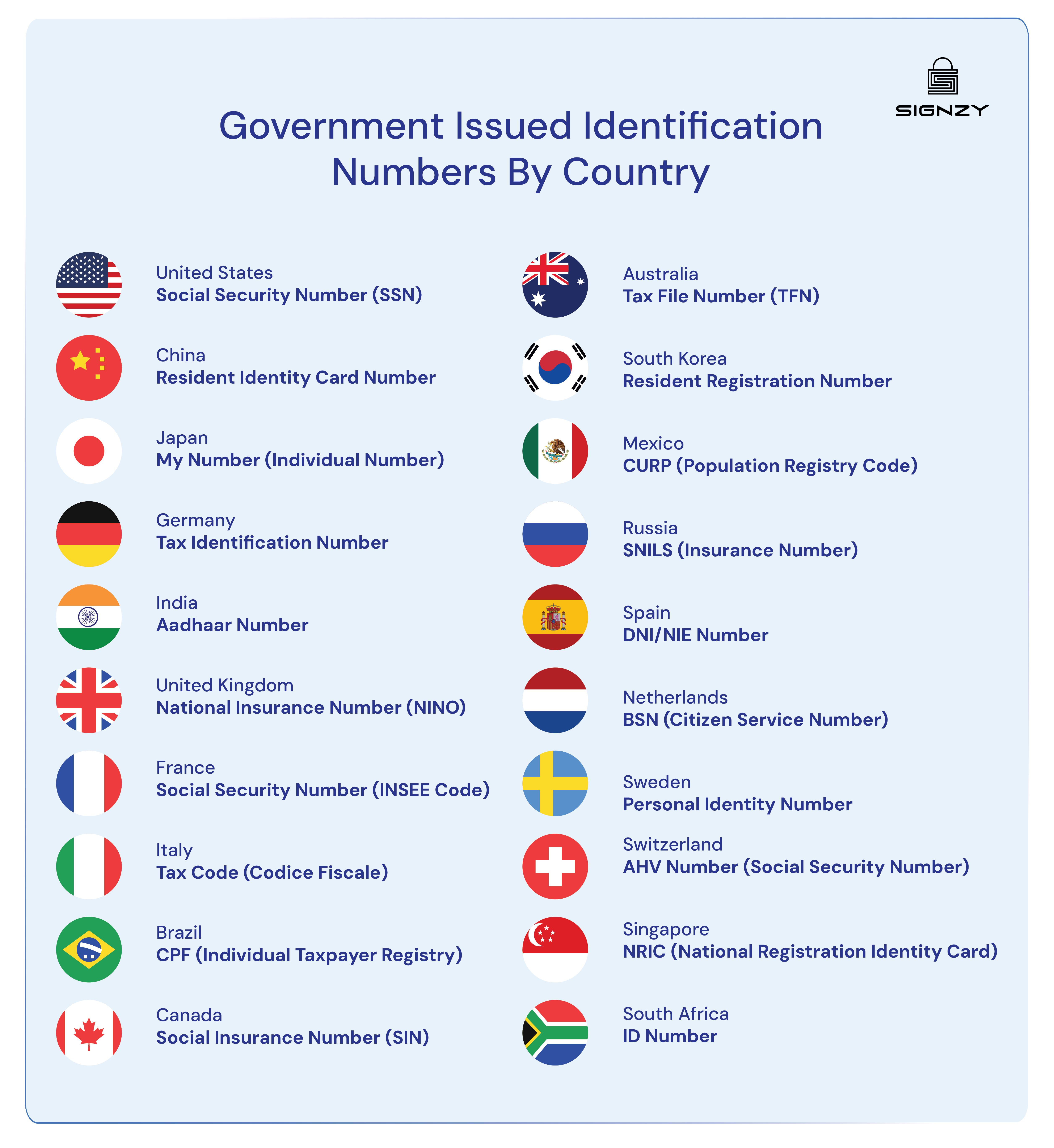What is a Government Issued Identification Number? Types, Uses & More
September 5, 2025
7 minutes read
- Government identification numbers serve as unique digital fingerprints, enabling citizens to access essential services and verify identity for financial transactions.
- Beyond national IDs, governments issue specialized numbers for businesses, professionals, marriages, passports, and military service for distinct administrative purposes.
- Financial institutions use government ID numbers for KYC compliance, account opening, loan processing, and Anti-Money Laundering regulations mandated by authorities.
Ever wondered about that mysterious string of numbers the government assigns you? Whether it’s your Social Security Number, your driver’s license number, or another official ID number, these digits follow you throughout your entire life.
But what exactly are these numbers for, and why does every government agency seem obsessed with them? If you’ve ever filled out a job application, filed taxes, or applied for benefits, you’ve encountered government identification numbers.
The truth is, these numbers are way more important than most people realize – and way more vulnerable to misuse than you might think. That’s why I’ve put together this complete guide to help you understand what these numbers are and how to protect yourself from identity theft.
By the time you finish reading, you’ll know exactly which numbers matter most and how to keep them secure.
Government Issued Identification Number, Quick Definition
A government-issued identification number is basically your official “ID code” that the government gives you to keep track of who you are in their system. Think of your Social Security Number if you’re in the US, your Aadhaar number in India, or your National Insurance Number if you’re in the UK.
💡 Related Blog: What is Government ID Verification? Step-by-Step Guide for businesses
How Many Types of Government Identification Numbers Are There?
Giving an exact number of how many types of Government Identification Numbers there are is quite hard since there are plenty of countries, and each country uses their own methods to assign identification numbers to their citizens. But as far as I am concerned, there are three main umbrellas that cover most government-issued identification numbers worldwide.
Federal (National) Government ID Numbers
As said earlier, different countries have their own ways of giving ID numbers to people. But to keep things simple, let’s take the United States as an example. The federal government uses a few main ID numbers for both individuals and businesses.
- Social Security Number (SSN): The Social Security Administration hands out these nine digits to track your work earnings. When retirement rolls around, they look at this record to calculate your monthly check. The same goes for disability payments if something happens to you.
- Individual Taxpayer Identification Number (ITIN): The IRS has created ITINs for immigrants, foreign workers, and their kids who need to file returns. No SSN? No problem – you still have to pay taxes.
- Employer Identification Number (EIN): Think of this as your business’s Social Security Number. Every company needs one for tax filings. Companies with employees need one. So do partnerships, nonprofits, and trusts.
- Passport Number: Every passport gets its own number that links to your travel records at the State Department. Get a new passport? You get a completely different number. This helps track which document is still valid and where you’ve been.
- Military ID Numbers: Soldiers, sailors, and airmen get ID numbers that stick with them forever – even after they leave the service. The VA and Pentagon use these numbers to track your benefits, medical care, and service record.
While these federal ID numbers apply nationwide, some forms of identification are managed at the state level. And they are just as important in day-to-day life.
State and Local Government ID Numbers
States and local governments run their own ID systems, too. Each one works differently depending on where you live.
- Driver’s License Numbers: Every state does this their own way. California might give you a simple sequence of numbers. Meanwhile, Florida builds your birth year right into the license number. Some states even code your gender or which DMV office issued your license. There’s no standard format anywhere.
- Professional License Numbers: Want to practice medicine in Texas? You need a Texas medical license with a specific number. Move to Ohio? You start the licensing process all over again. Lawyers, real estate agents, accountants – they all go through the same thing. Your license number proves you can legally work in that profession within state borders.
- Voter Registration Numbers: Sign up to vote, and your state gives you a voter ID number. Election workers use these to prevent duplicate voting. They also help track which ballots belong to which districts during close recounts.
Beyond federal and state systems, some ID numbers exist for very narrow purposes.
Specialized Government ID Numbers
Beyond your main national ID number, governments love giving out specialized numbers for specific situations. These work as your “membership numbers” for different parts of the government system.
Here are some common ones you might encounter:
- Starting a business → Employer Identification Number (EIN) for taxes
- Getting married → Marriage certificate number for legal records
- Traveling abroad → Passport number for international identification
- Working in healthcare → Professional license number for medical practice
- Joining the military → Service member identification number
- Registering to vote → Voter registration number for elections
- Filing bankruptcy → Case number for court proceedings
The thing is, these numbers pile up over time. A single person might have five or six different government numbers by the time they’re adults, each serving a completely different purpose in the bureaucratic machine.
How are Government Issued Identification Numbers Used?
Government ID numbers are basically your bread and butter. You can’t open accounts, process loans, or handle big transactions without them. Here’s where you’ll be asking customers for these numbers every single day:
| Situation | Government ID Number Use |
| Opening New Accounts | KYC rules mean you’ve got to verify who people are before letting them bank with you. ID numbers make this quick and easy instead of drowning in paperwork and manual checks. |
| Processing Loans | You need to pull credit reports and verify income history. Without their government ID number, you’re flying blind on whether someone can actually pay you back. |
| Issuing Credit Cards | ID numbers let you check their credit score, payment history, and existing debts. Plus, it stops fraudsters from using fake identities to rack up charges they’ll never pay. |
| Wire Transfers | Big money movements get flagged automatically. The ID number helps track everything properly, so regulators stay happy and suspicious transfers get caught before causing problems. |
| Business Accounts | You need to know who actually owns the company you’re dealing with. ID numbers help you figure out if it’s a legitimate business or just a front for something sketchy. |
| Corporate Banking | Large business accounts require knowing all the key players and beneficial owners. ID numbers make it simple to verify everyone involved and keep your records straight. |
How to Verify Government Issued Identification Numbers?
Verifying government ID numbers sounds straightforward until you actually have to do it at scale. Sure, you can eyeball documents and cross-check numbers manually, but that approach falls apart fast when you’re processing hundreds or thousands of applications. Plus, fraudsters are getting smarter with fake documents, and a single verification mistake can cost your business big time in compliance issues or fraud losses.
The good news? You’ve got options for handling ID verification, though some work way better than others:
- Do it yourself manually: Time-consuming, error-prone, and basically impossible to scale as your business grows
- Outsource to contractor agencies: Risky approach since you’re putting sensitive customer data in someone else’s hands, plus you lose control over timing and quality.
- Use technology to keep it in-house: A Perfect solution that gives you speed, accuracy, and complete control over your verification process.
APIs are really the sweet spot here because they integrate directly into your existing systems and give you real-time verification results. No more waiting around for manual checks or worrying about third-party security breaches.
At Signzy, we’ve built verification APIs that can instantly validate government ID numbers across multiple countries, including the major economies like the US, UAE, Mexico, India, Brazil, and more. Our APIs integrate seamlessly into your workflow, giving you the speed and accuracy you need without the headaches.
Ready to see how much easier ID verification can be? Book a demo with us today.
FAQs
What happens if I lose my government ID number?
You can’t really “lose” your number since it stays the same for life, but you can request official documents from the issuing agency if you forget it.
Can government ID numbers be changed or updated?
Generally, no – these numbers are permanent. Only in rare cases, like identity theft or witness protection programs, can governments issue new numbers.
Are government ID numbers the same as driver's license numbers?
No, they’re different. Your Social Security Number is federal, while driver’s license numbers are issued by individual states and follow different formats.
How do I know if my government ID number is being used fraudulently?
Monitor your credit reports, watch for unauthorized accounts or loans, and check government benefit statements for suspicious activity regularly.














